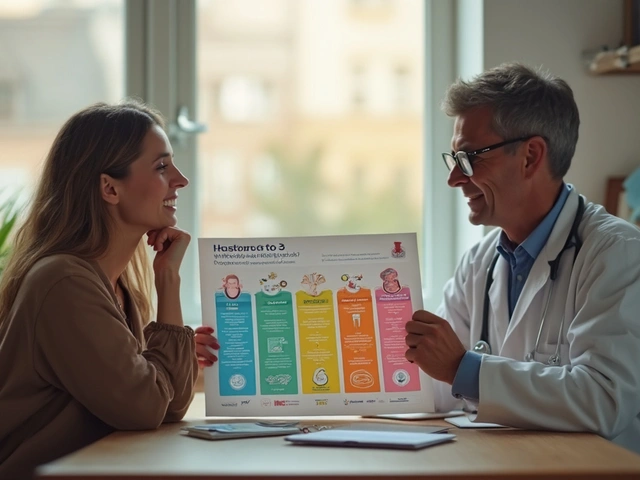May 2025 Archive — Practical Pharma Guides
This month we challenged common assumptions: an antidepressant many start without full facts, what to do when amoxicillin fails, a surprising Alzheimer–stroke connection, and whether the old herb tansy is actually safe. Each piece gives clear, usable steps — no fluff.
Top reads and quick takeaways
Celexa (citalopram): clear answers. If you or someone you care for is starting Celexa, the article breaks down how it works, likely benefits, and the side effects that matter most. Key points: start low and be patient — antidepressants take weeks to change mood; older adults usually have lower max doses because Celexa can affect heart rhythm at higher levels; watch for serotonin syndrome when combining with other serotonergic drugs; and common early effects include nausea and sleep changes that usually ease. Practical tip: track your mood and side effects in a simple daily log and share it with your prescriber at follow-ups.
Best safe alternatives to amoxicillin. When amoxicillin isn’t working or causes problems, you don’t have to guess the next move. The guide explains common reasons to switch — allergy, resistance, or bad side effects — and lists reasonable alternatives (for example, amoxicillin-clavulanate, certain cephalosporins, doxycycline, or macrolides depending on the bug and allergy status). It stresses getting a culture or sensitivity when possible, avoiding broad switches that drive resistance, and asking your clinician about local resistance patterns. Practical tip: if you’re allergic to penicillin, tell your provider the exact reaction (rash vs. anaphylaxis) so they can pick a safe substitute.
Alzheimer’s disease and stroke — the hidden link. The post explains how vascular damage and tiny strokes raise dementia risk and how the two conditions often overlap. It gives clear actions: control blood pressure and atrial fibrillation, manage blood sugar, stop smoking, and prioritize regular activity and a Mediterranean-style diet. Small, steady changes here lower both stroke and dementia risks. Practical tip: bring your blood pressure and A1C numbers to appointments and ask how each affects long-term brain health.
Tansy — dosage, risks, and toxicity. Tansy is an old herb people still talk about, but it’s not harmless. The article explains the main concern — compounds like thujone can cause nausea, liver stress, and even seizures in high doses. There’s no standard safe dose for medicinal use, so the piece recommends avoiding concentrated extracts, especially if you’re pregnant, breastfeeding, or on other meds that strain the liver. Practical tip: if you’re curious about an herb, ask your pharmacist about interactions and start by discussing it with your clinician before trying it.
Each May post aims to help you make smarter, safer choices about meds and health. If one topic matters to you, bookmark it or save the short checklist from the article so you have clear steps when you need them.
Best Safe Alternatives to Amoxicillin: Expert Guide on Switching Antibiotics
Not every infection listens to amoxicillin. This guide digs into what to do when that go-to antibiotic fails or stirs up trouble. We’ll break down clinical advice on switching to safe alternatives, explore common complications that force the swap, and give you practical tips for a smooth transition. Get all the facts and strategies for finding the right replacement for amoxicillin. Stay ahead of bacterial resistance and protect your health with informed choices.
Celexa: Clear Answers About Citalopram, Depression, and Side Effects
Celexa—also called citalopram—is a common antidepressant used to treat depression and anxiety. This article unpacks exactly how Celexa works, who might benefit, what side effects you might run into, and practical tips for living well while on it. You’ll find real data, easy-to-understand explanations, and guidance to ease your mind about starting or continuing Celexa. Whether you’re curious, worried, or just want the facts, this deep dive offers honest clarity.
Alzheimer's Disease and Stroke: The Hidden Link You Should Know
Discover the surprising connection between Alzheimer-type dementia and stroke, how these conditions overlap, and what it means for your brain health. This detailed guide unpacks the science, shares real stats, and gives genuinely helpful tips for protecting your memory and mental sharpness. Learn how lifestyle and medical choices can influence both dementia and stroke risks. Get a clear picture of prevention strategies and emerging research. No jargon—just well-explained, actionable insights anyone can use.
About
Health and Wellness, Health and Medicine
Latest Posts


Natural Disasters and Drug Shortages: How Climate Change Is Cutting Off Life-Saving Medicines
By Marcel Kornblum Feb 20, 2026

Aluminium Hydroxide in Food: Is it Safe?
By Marcel Kornblum Jun 18, 2023

Discover Top Levitra Discounts and Deals for Your Health
By Marcel Kornblum Dec 28, 2024



